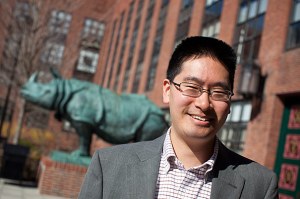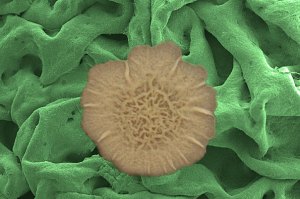Tag: Cellular Biology
-
Health
Kidney close-up
Scientists at Harvard have created breathtaking three-dimensional images of an entire organ, moving a step closer to understanding the complex development of the kidney.

-
Campus & Community
Harvard Thinks Big 2: “From Eye to Mind: Affirming the Union of Science and Art” – Robert Lue
Robert Lue, Professor of the Practice of Molecular and Cellular Biology; Tutor in Biochemical Sciences; Director of Life Sciences Education
-
Science & Tech
Slimy secrets
Harvard researchers have discovered that Bacillus subtilis biofilm colonies exhibit an unmatched ability to repel a wide range of liquids — and even vapors. The finding holds promise for developing better ways to eliminate harmful biofilms that can clog pipes, contaminate food production and water supply systems, and lead to infections.

-
Health
New type of human stem cell may be more easy to manipulate
Harvard Stem Cell Institute (HSCI) researchers at the Massachusetts General Hospital Center for Regenerative Medicine (MGH-CRM) have a developed a new type of human pluripotent stem cell that can be…
-
Health
Gene silencing may cause limitations of induced pluripotent stem cells
Scientists may be one step closer to being able to generate any type of cells and tissues from a patient’s own cells, according to the results of a new study by Harvard…
-
Science & Tech
The Postdocs
Some physicists spend their lives obsessed with questions about the possibility of parallel universes, or of travel at the speed of light. Amy Rowat is obsessed with the mechanical properties of the tiny…
-
Health
Treatment resistance in some cancer cells may be reversible
The ability of cancer cells to resist treatment with either targeted drug therapies or traditional chemotherapy may, in some cases, result from a transient state of reversible drug “tolerance.” In…
-
Campus & Community
Jack Strominger receives AAI mentoring award
Jack Strominger, the Higgins Professor of Biochemistry in the Department of Molecular and Cellular Biology, was recently honored with the AAI Excellence in Mentoring Award “in recognition of exemplary career contributions to a future generation of scientists,” by the American Association of Immunologists.
-
Health
Fishing for new medications
A robust new technique for screening drugs’ effects on zebrafish behavior is pointing Harvard scientists toward unexpected compounds and pathways that may govern sleep and wakefulness in humans. Among their…
-
Health
Researchers ‘NOTCH’ a victory in war on cancer
Normal 0 0 1 819 4673 38 9 5738 11.1282 0 0 0 Scientists have devised an innovative way to disarm a key protein considered to be “undruggable,” meaning that…
-
Health
From stem cells to functioning strip of heart muscle
A team of Harvard Stem Cell Institute (HSCI) scientists at Massachusetts General Hospital (MGH) and collaborators at Harvard’s School of Engineering and Applied Sciences (SEAS) has taken a giant step toward…
-
Health
Harvard team reports major step forward in cell reprogramming
A team of Harvard Stem Cell Institute (HSCI) researchers has made a major advance toward producing induced pluripotent stem cells, or iPS cells, that are safe enough to use in…
-
Health
New metabolic safeguards against tumor cells revealed
Cells don’t like to be alone. In the early stages of tumor formation, a cell might be pushed out of its normal home environment due to excessive growth. But a…
-
Health
New steps forward in cell reprogramming
Harvard Stem Cell Institute (HSCI) researchers at Massachusetts General Hospital (MGH) have substantially improved the odds of successfully reprogramming differentiated cells into induced pluripotent stem cells (iPS) by blocking the…
-
Health
Scientists create energy-burning brown fat in mice
Harvard researchers at Dana-Farber Cancer Institute have shown that they can engineer mouse and human cells to produce brown fat, a natural energy-burning type of fat that counteracts obesity. If…
-
Health
Glimpsing the birth of our earliest reproductive cells
It has long been a mystery how the developing embryo designates those rare, precious cells destined to produce sperm and eggs — enabling us to have offspring – since these…
-
Health
Computer scientists model cell division
Computer scientists at Harvard have developed a framework for studying the arrangement of tissue networks created by cell division across a diverse set of organisms, including fruit flies, tadpoles, and…
-
Health
Researchers solve ‘bloodcurdling’ mystery
By applying cutting-edge techniques in single-molecule manipulation, researchers at Harvard University have uncovered a fundamental feedback mechanism that the body uses to regulate the clotting of blood. The finding, which…
-
Health
How growing cells move together
Our cells are more than inert bags of proteins and genes whose complex signaling networks confound the world’s most powerful computers. They also have a physical side whose brawny feats…
-
Science & Tech
Embryo’s heartbeat drives blood stem cell formation
Biologists have long wondered why the embryonic heart begins beating so early, before the tissues actually need to be infused with blood. Two groups of Harvard Stem Cell Institute (HSCI) researchers from Children’s Hospital Boston (Children’s) and Brigham and Women’s Hospital (BWH) — presenting multiple lines of evidence from zebrafish, mice, and mouse embryonic stem…
-
Health
Geometry plays part in cellular protein arrangement
Harvard researchers examining the activity of a common type of soil bacteria have taken another step in understanding the inner workings of cells, showing that proteins can arrange themselves according to a cell’s inner geometry.
-
Health
For cancer cells, genetics alone is poor indicator for drug response
In certain respects, cells are less like machines and more like people. True, they have lots of components, but they also have lots of personality. For example, when specific groups…
-
Health
How stem cells find their way around
Harvard Stem Cell Institute (HSCI) researchers have for the first time identified in mice a cellular mechanism that directs stem cells to their ultimate destination in the body.
-
Health
Mechanism directing stem cells to their destination identified;
Harvard Stem Cell Institute (HSCI) researchers have for the first time identified in mice a cellular mechanism that directs stem cells to their ultimate destination in the body. The finding…
-
Health
Study IDs human genes required for hepatitis C viral replicating
Massachusetts General Hospital (MGH) researchers are investigating a new way to block reproduction of the hepatitis C virus (HCV) — targeting not the virus itself but the human genes the virus exploits in its life cycle. In the March 19 Cell Host & Microbe, they report finding nearly 100 genes that support the replication of…
-
Health
Scientists create cell protein machinery
Harvard scientists have cleared a key hurdle in the creation of synthetic life, assembling a cell’s critical protein-making machinery in an advance that has practical, industrial applications and that enhances our basic understanding of life’s workings.
-
Health
Blood types indicate greater risk for cancer
Offering a novel clue about the basic biology of pancreatic cancer, researchers at Dana-Farber Cancer Institute have confirmed a decades-old discovery of a link between blood type and the risk of developing the disease.
-
Health
Capillary formation’s mechanical determinants
Harvard researchers have established a link between the growth of blood vessels and the mechanical stresses caused by the environment within which the vessels grow, a new understanding that researchers hope can lead to novel disease treatments based on manipulating blood flow to living tissues.
-
Health
Science programs advancing
Harvard President Drew Faust today renewed the University’s commitment to the vision of advancing interdisciplinary, collaborative science in general, and the Department of Stem Cell and Regenerative Biology (SCRB), the Harvard Stem Cell Institute (HSCI), and the Wyss Institute for Biologically Inspired Engineering (WIBIE) in particular.


